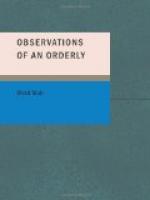In a higher class there is restraint and a rather stupid bashfulness. I have seen a wounded youngster flush apprehensively and only peck his mother in return for her sobbing embrace. That is not Bert’s way. He knows—he is not a fool—that his mother looks a trifle absurd as, with bonnet awry, she surges perspiringly past the sentries, the tails of her skirt dragging in the dust and her feet flattened with the weight of over-clad, unwholesome obesity they have to bear. But he hobbles sprily to meet her, and his salute is no mere peck, but a smacking kiss, so noisy that it makes everyone laugh. He laughs too—perhaps he did it on purpose to raise a laugh: that is his quaint method; but the fact remains that, whatever his motive, he has managed to please his mother. She is sniffing loudly yet laughing also, and one could want no better picture of human affection than this of Bermondsey Bert and his shapeless, work-distorted, maybe bibulous-looking mother, exchanging that resounding and ungraceful kiss at the hospital gate. I have heard Bert shout “Mother!” from a hundred yards off, when he spied her coming through the gate. No false shame there! No smug “good form” in that—nor in the time-honoured jest which follows: “And ’ave you remembered to bring me a bottle of beer, mother?” (Of course visitors are not allowed to introduce alcohol into the hospital—otherwise I am afraid there is no doubt that mother would have obliged.)
In one of our wards we harboured, for a while, a costermonger. This coster, an entertaining and plucky creature who had to have a leg amputated, received no callers on visiting day: his own relatives were dead and he and his wife had separated. “Couldn’t ’it it orf,” he explained, and with laudable impartiality added, “Married beneath ’er, she did, w’en she married me.” As the lady was herself a coster, it was plain that here, as in other grades of society, there are degrees, conventions and barriers which may not be lightly overstepped. “Sister,” however, thought that the patient should inform his wife that he had lost his leg, and prevailed on him to send her a letter to that effect. A few days later he was asked,
“Well, did you write and tell your wife you had lost a leg?”
“Yus.”
“I suppose she’s answered? What has she said?”
“Said ’m a liar!”
Her retort had neither disconcerted nor offended him. He was a philosopher—and, like so many of his kind, a laughing philosopher. When he was sufficiently recovered from his operation to get about on crutches he was the wag of the ward. He took a special delight in those practical jokes which are invented by patients to tease the nurses, and devoted the most painstaking ingenuity to their preparation. It was he who found a small hole in the lath-and-plaster wall which separates the ward from the ward’s kitchen. Through this hole a length of cotton was passed and tied to the handle of a mug on the kitchen shelf. At this period,




